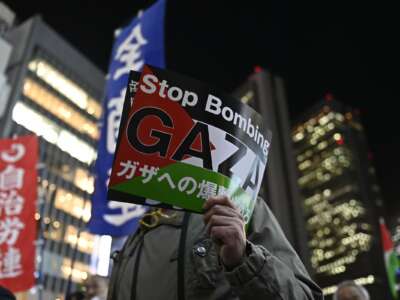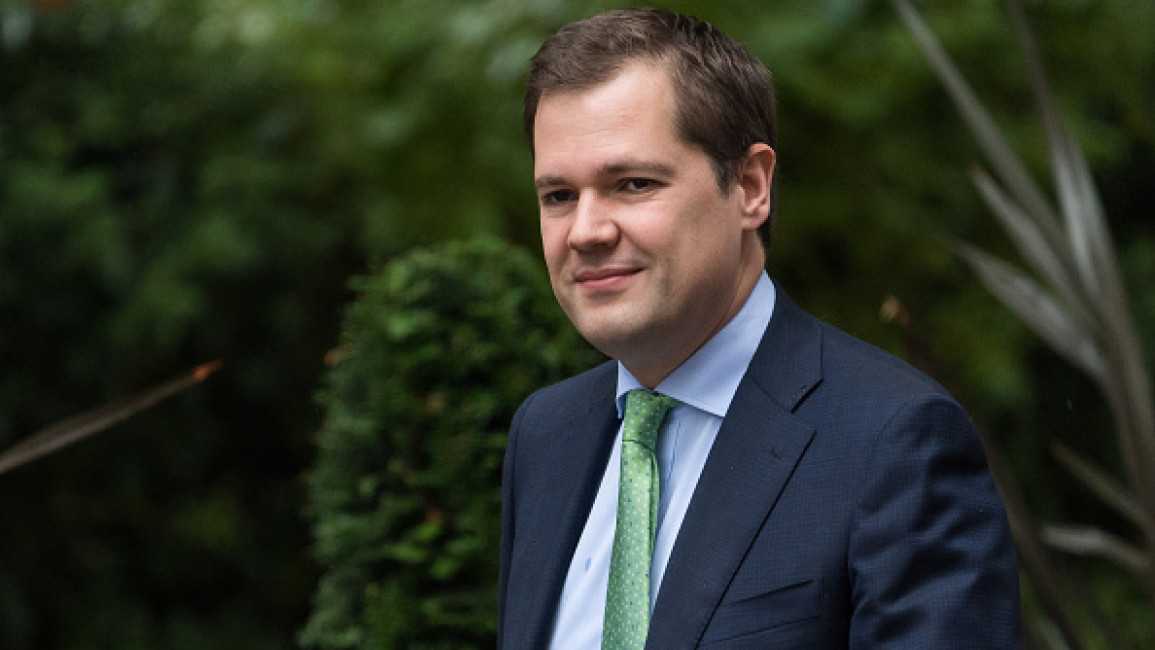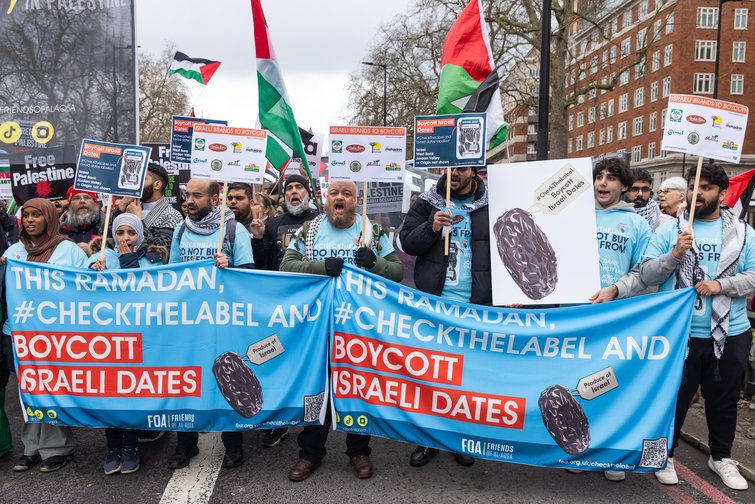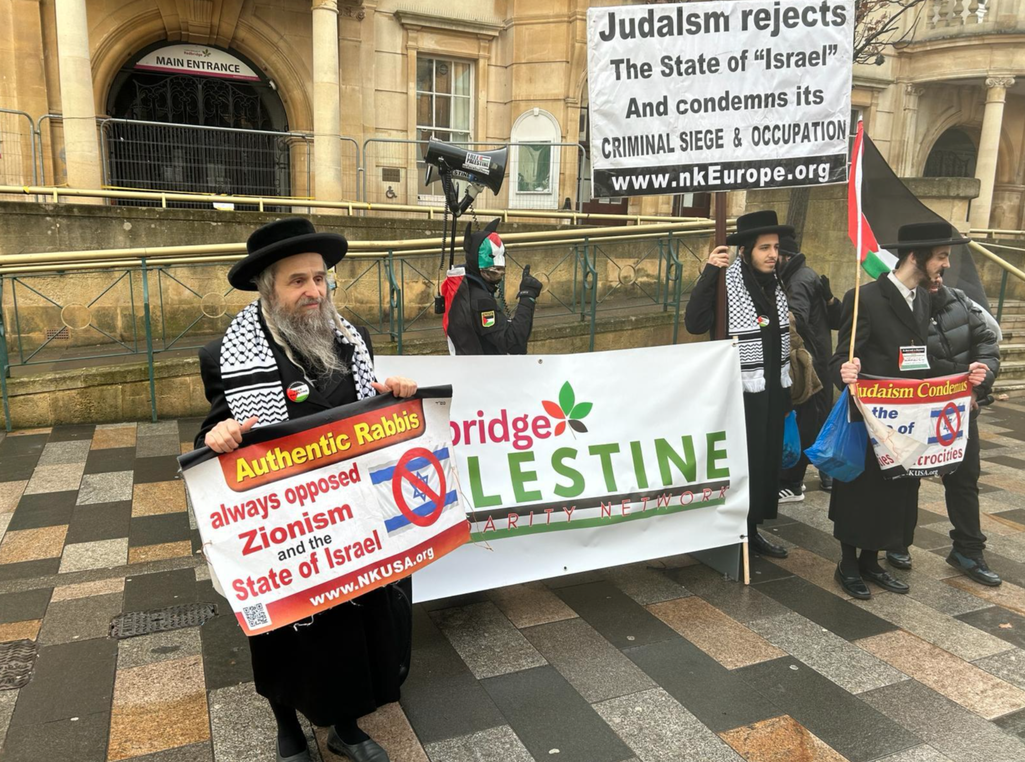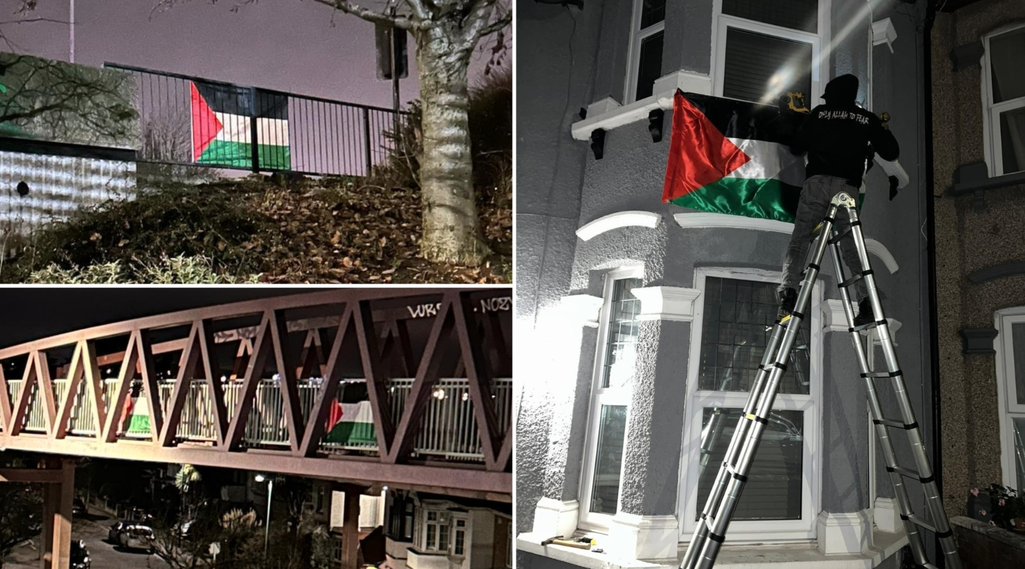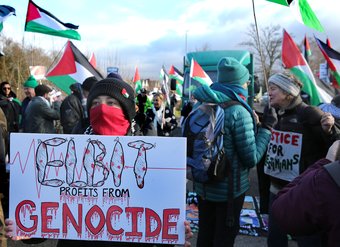Boycott, divestment and sanctions offer a collective way to pressure Israel toward a ceasefire and an end to apartheid.
By Stéphanie Wahab ,
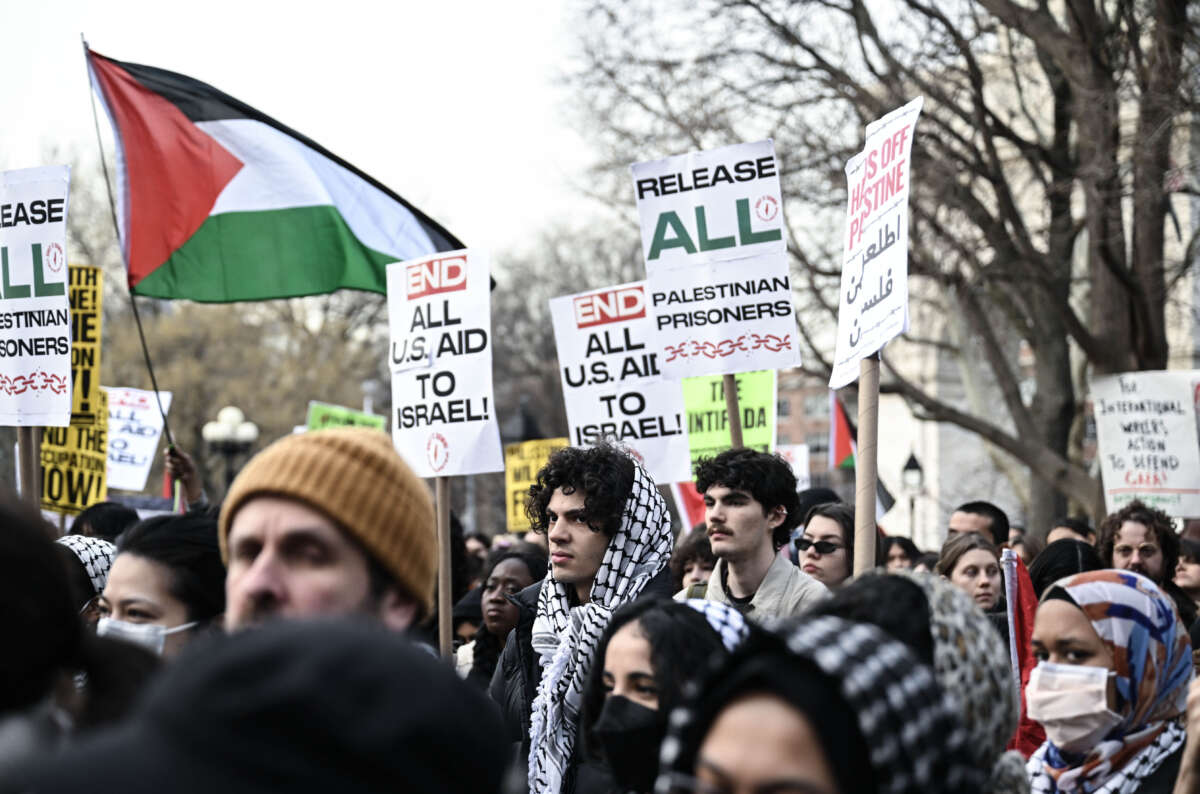
We are months into Israel’s latest brutal campaign against Palestinians, with no sign of an end to the slaughter of civilians and society. The statistics, the stories, the images and witness testimonies are breathtakingly horrifying. The world has heard the genocidal intent from “every sphere of the state of Israel,” South African lawyer Tembeka Ngcukaitobi said to the International Court of Justice. The global community has seen the atrocities in real time. No amount of Israeli officials’ gaslighting can erase the desperate cries and pleas from fathers, mothers, children, siblings, friends and colleagues.
The enormity of this violence and suffering can’t be held individually, and attempting to do so leads to feelings of overwhelm and helplessness. Systems of oppression — steeped in supremacy, embedded in social and governmental institutions, and fine-tuned over decades — rely on people becoming tired, disheartened and weary, which facilitates inaction. Consequently, it is understandable that an individual coping response to cruelty of this magnitude is to believe that, “there is not much I can do to stop the genocide.”
What if there are some forms of violence and human suffering (think genocide, slavery, the Holocaust) that aren’t meant to be held alone, but rather, can only be held with others, in community? What if we choose to see, feel, grieve, think and act collectively in the face of Israel’s relentless violence against Palestinians in and out of Gaza?
Boycott, Divestment, Sanctions (BDS) provide a collective, civil society, nonviolent means of pressuring Israel toward a ceasefire, as well as pressuring it to end the genocide, apartheid and occupation. BDS is the largest global Palestinian solidarity movement, influenced by South Africa’s anti-apartheid movement. It aims to challenge Israel’s use of apartheid as a technology of settler colonialism. BDS can be an entry point into collective action, alongside other interventions to effect change. That BDS has been criminalized in some states speaks to the ways it is perceived as a threat by Zionist entities.
The company’s CFO said the decision was made in compliance with the ICJ’s recent genocide ruling.By Sharon Zhang , TRUTHOUT February 6, 2024
In recent years, academic boycotts have been particularly contentious. Academic boycotts call for a boycott of Israeli academic institutions due to their complicity in Israel’s denial of Palestinian rights as articulated by international law. More specifically, the call is to “to boycott and/or work towards the cancellation or annulment of events, activities, agreements, or projects involving Israeli academic institutions or that otherwise promote the normalization of Israel in the global academy, whitewash Israel’s violations of international law and Palestinian rights, or violate the BDS guidelines.” Details and guidelines for academic boycotts can be found here.
Palestinians have always valued education, as evidenced by the fact that Palestinians have one of the highest literacy rates in the world, coupled with an exceptionally high rate of Ph.D.s per capita. In the current phase of the ethnic cleansing of Palestinians in Gaza and the West Bank, Israel has destroyed every institution of higher learning in Gaza. Every single one. Any scholar who believes in academic freedom should appreciate the scholasticide and sociocide implicit in the targeted destruction of every university in Gaza, not to mention the added fact that nine out of ten schools for children have been significantly damaged. In addition, Israel has murdered university presidents, at least 94 university professors and at least 4,327 students since October.
During the past three months, Israeli forces have also entered universities in the West Bank and arrested students and faculty, including an incursion into An-Najah National University the week of January 19 where many were arrested. Even Palestinians studying and working in Israeli universities are harassed, targeted and denied academic freedom, including the right to education. Take for example the experience of my friend and colleague Nadera Shalhoub-Kevorkian, a chaired professor of law and social work at Hebrew University, and one of the few tenured Palestinian women in the Israeli academy. Shalhoub-Kevorkian signed a public letter on October 26, 2023, titled, “Childhood Researchers and Students Call for Immediate Ceasefire in Gaza,” condemning Israel’s killing of 3,000 (at the time, now over 11,000) children in Gaza, and affirming the preciousness of Palestinian children’s lives. The university response was swift and dangerous: a letter from the president that concluded, “We are sorry and ashamed that the Hebrew University includes a faculty member like you. In light of your feelings, we believe that it is appropriate for you to consider leaving your position.”
This response further endangered Shalhoub-Kevorkian and her family in the face of other threats they received. She experienced debilitating fear and could not leave her home for weeks. Such a violation of the academic freedom of scholars of genocide and childhood trauma jeopardizes their lives and safety. The university didn’t argue with the facts of the public letter, but rather with its context and framing, which situated the killing of children in Gaza within the ongoing settler colonial violence against Palestinians.
Even before Israel’s latest attack on Gaza, it has acted to control indigenous knowledge production through military closure and invasions of college campuses. Additional technologies of censorship, harassment and interference with Palestinian basic rights to education have also included detention and incarceration of faculty and students, as well as surveillance and control of Palestinian curricula and learning. Take for example the 2006 law prohibiting the mention of the Nakba in textbooks, or the 2011 prohibition on institutions holding remembrance ceremonies for the Nakba.
Ultimately, the targeting of Palestinian and anti-Zionist students and faculty, who speak out against the genocide and occupation in Israel, Palestine, and around the globe, enacts a type of epistemic violence (a violence against the mind and knowledge). This form of control serves not only to erase Palestinians, but also to erase our refusal and dissent to our subjugation.
As Steven Salaita has recently written on this topic, “Reluctance to boycott is no longer acceptable.” We have witnessed in the past three months students and faculty around the globe supporting a ceasefire and an end to the occupation. Such support is not a condemnation of Jewish people, nor is it antisemitic, but rather a declaration of support for Palestinian humanity, self-determination and international law. For those searching for opportunities to witness and hold the suffering of Palestinians with others, as well as translate that witnessing into action, the BDS movement provides an avenue into collective action.
To support the renewed push for BDS in this horrific moment, I am sharing below a chapter on BDS within the social work field, which I wrote for a forthcoming anthology that will be published this spring by Haymarket Books: Abolition and Social Work: Possibilities, Paradoxes, and the Practice of Community Care (edited by Mimi E. Kim, Cameron Rasmussen, and Durrell M. Washington, with a foreword by Mariame Kaba). The chapter discusses in detail each of the three BDS tactics.
Boycott, Divestment, Sanctions as Abolitionist Praxis for Social Work
There may be few issues that test social work’s stated values of social justice, human dignity, and worth more than the ongoing Israeli occupation of Palestine. Following the razing of 500 Palestinian villages and the displacement of the majority of the Palestinian population in 1948, Israel has engaged in consistent acts of genocide, violence, and oppression against Palestinians through its carceral political and legal systems. The violence of Israel’s settler colonialism provides social work with a real-life case study of ongoing genocide, apartheid, dispossession, racism, and carcerality. Although Palestinians are not uniquely defined by their dispossession and suffering, I bring these affective, material, political, social, and economic conditions to bear to shine a light on a system of apartheid, reliant on international support, and a matrix of incarceration. The international community must act now. Furthermore, I call attention to Israel’s carceral violence to invite social work colleagues around the world to work in solidarity with Palestinians to hold Israel accountable for its ongoing attempts of erasure of the Indigenous people of Palestine, and to abolish the Israeli occupation of Palestinians and their land.
Social Work Silence and Complicity
Over the course of thirty years in social work, I’ve noticed that most social work academics, students, and practitioners in the United States (I feel this is different outside of the United States) know very little about the history and present of Palestine. This ignorance runs parallel to a silence about Israeli oppression of Palestinians, a silence often referenced as progressive except for Palestine, where social and political groups customarily outraged by racism, apartheid, and human dispossession remain silent. “Too often, social work has chosen professionalization, growth and partnership with harmful state agencies over social justice, solidarity, and self-determination. When it comes to Palestine, there is even more pressure to be quiet.” Orientalism, settler colonialism, anti-Arab racism, and taken-for-granted Zionist myths contribute to this ignorance, and readers may find detailed discussions of this issue else- where. What is relevant (and connected to this ignorance), however, is the global social work silence in the face of Israeli necropolitics and the necrocapitalism of Zionism. Necro comes from the Greek root nekros, which means “corpse,” hence necropolitics refers to the “politics of death.” Achille Mbembe defines necropolitics as a framework for understanding “contemporary forms of subjugation of life to the power of death.” Necrocapitalism extends Mbembe’s theorizing of necropolitics to focus on accumulation through death. More specifically, necrocapitalism speaks to “practices of organizational accumulation that involve violence, dispossession, and death.” This silent bystanderism, Palestinian social workers notwithstanding, is deafening in the face of social work’s explicit commitments to social justice, human dignity, and human worth. Nevertheless, I remain hopeful in the face of recent shifts in certain spaces toward Palestinian solidarity, especially among abolitionist communities, as evidenced by the inclusion of this chapter in this text.
Apartheid and the Matrix of Incarceration
A robust understanding of the relationship between abolition and Palestinian liberation requires a basic understanding of the settler colonial violence of Zionism, and although a thorough discussion of the racism of Zionism goes beyond the scope of this chapter, I do wish to note some of the linkages for those who are new to understanding Palestinian dispossession and liberation. It is important for readers to understand that the occupation is a structure within Zionism. I lean on understandings of Zionism that frame it as always having been a European colonial project that evolved into an imperial project sustained by the United States. As many have previously argued, Zionism’s early writings reveal that the dispossession of the Palestinian people was always at the core of Zionism, hoping to render us as “no people.” My colleague and I have argued elsewhere:
Zionism’s domination over Palestinian bodies, land, life, and psyche exists to nurture a binary necropolitics (Mbembe, 2003), where there are those who should be killed, and those who always and forever possess the right to maim, kill, and eliminate (Puar, 2017). Such logic is apparent in Israel’s Jewish Nation-State Law as it maintains the exclusivity of the Jewish Israeli state, and the demonization of the disposable other (Jabareen and Bishara, 2019). Framing settlers as always-and-forever victims, rather than as invaders and abusers, ignores Palestinian ordeals, and erases historical memory alongside present narration (Zreik, 2016). Ultimately, the state’s brutal attacks, denial of historical and present injustices, coupled with the dismemberment of the Palestinian social, cultural, and spiritual fabric, together constitute intentional national domicide alongside racialized dehumanization.
Beginning in 1948, when Israel established two separate sets of laws — civilian for Jews, and military for Palestinians — Israel has relied on physical and affective containment of Palestinians to fortify its project of erasure and co-optation. One does not need to engage a deep dive inside Israeli laws and policies to see evidence of the carceral blueprint of Zionism and the occupation. Gaza provides the most extreme example of Zionism’s carceral backbone, often referred to as the “the world’s largest open-air-prison,” with 1.8 million people trapped within 138 square miles. The vast majority of Palestinians in Gaza cannot leave as land, sea, and air borders are controlled by Israel, effectively making Israel the warden of the Palestinian prisoners inside Gaza.
Another glaring example of Zionism’s carcerality is the apartheid wall, referenced by Zionists as the “security barrier,” spanning 472 miles and standing 26 feet high (twice as high as the Berlin wall), and present in Bethlehem, parts of Ramallah, Qalqilya, parts of Tulkarm, and throughout East Jerusalem. The apartheid wall was deemed illegal by the International Court of Justice at The Hague in July 2004, with the court stating that the wall violates international law by restricting Palestinian movement and access throughout the West Bank and is “tantamount to de facto annexation.” Despite calls for an immediate stop to construction alongside reparations for the damage caused, Israel ignored the United Nations’ decree as it has consistently done since 1948 and continues to build the wall alongside illegal settlements to this day. The conditions containing Gaza coupled with the apartheid wall represent just two glaring examples of Israel’s incarceration of Palestinians, where fences, walls, crossing points, and 500 checkpoints and roadblocks are strategically built and maintained to create a sophisticated web of containment, what I refer to as a “matrix of incarceration,” with the aim of preventing Palestinian access to their lands, homes, medical care, families, work, water, human dignity, and human rights. Working alongside these physical containment structures are also practices of home arrests, home demolitions, exile, collective punishment, and the criminalization of Palestinian nonprofit human rights organizations. These practices function like a swarm, expanding and entrenching the matrix of incarceration, effectively creating militarized “reservations” or “choking system of Bantustans.” Shai Gortler uses the term Israeli carceral dispositive to reference the web of government, security, and psychological control holding up and enacting Israel’s apartheid state:
Israeli carceral dispositive—a term I use to indicate the assemblage of the Israeli Prison Service, the General Security Services, government officials, and, more importantly, Israeli public opinion and the Zionist psyche—has employed prisoners’ self-identification and their collective organization to better control them. It does so by encouraging regional identifications over national ones, by dividing the prisoners, and by encouraging a self-interested comportment.
Reading political prisoner Walid Daka, Gortler argues that these assemblages are not only meant to erase Palestinians, but also to create particular (obedient and more passive) Palestinian subject positions:
If the segregated areas Israel demarcated for Palestinians in the occupied territories are akin to bigger prisons, and its practices towards Palestinians in the smaller prisons are a continuation of its policy in the larger ones, then it is useful to first apply theoretical tools to study the smaller prisons. The panopticon is the fundamental form of this control and surveillance that Israel conducts not only to enhance security but to re-shape people.
Consistent with carceral logics and practices, those who resist these forms of containment and dispossession are frequently criminalized, incarcerated, tortured, maimed, and murdered by Israel. Central to this discussion about Zionism’s matrix of incarceration is that it has been made possible via international support and complicity, particularly from the United States, such that every sitting U.S. president since Harry Truman has expressed unwavering support for the state of Israel. The United States alone has historically and consistently given billions ($3.8 most recently and double that for many years) of dollars on a yearly basis, alongside military and construction equipment, to support Zionism’s project of erasure.
Boycott, Divestment, Sanctions
Boycotts have long been an element of anticolonial struggles. Inspired by earlier Palestinian boycotts after the Nakba of 1948 (what Palestinians refer to as the catastrophe when half the population of Palestinians lost their homes and property in addition to becoming stateless in and out of historic Palestine), as well as the South African antiapartheid movement, Boycott, Divestment, Sanctions (BDS) is a Palestinian civil society, nonviolent social movement calling for freedom, justice, and equality. Formed in 2005, BDS is made up of academic associations, unions, refugee and women’s organizations, churches, and grassroots liberation organizations. BDS was created explicitly as an organized response to the settler colonial violence of Zionism and its violent and carceral conditions. Its founder Omar Barghouti wrote:
Faced with overwhelming Israeli oppression, Palestinians under occupation, in refugee camps and in the heart of Israel’s distinct form of apartheid have increasingly reached out to the world for understanding, for compassion, and, more importantly, for solidarity. Palestinians do not beg for sympathy. We deeply resent patronization, for we are no longer a nation of hapless victims. We are resisting racial and colonial oppression, aspiring to attain justice and genuine peace. Above all, we are struggling for the universal principle of equal humanity. But we cannot do it alone. Given its uncontested military superiority, the unquestioning and all-embracing support it enjoys from the world’s only empire and the lack of political will by Arab and European states to hold it in check, Israel has been gravely violating international law, with audacious impunity, showing little if any consideration for the UN or world public opinion.
Hence, the main goal of BDS is to render Israel compliant with international laws that recognize the West Bank, East Jerusalem, and the Syrian Golan Heights as occupied by Israel. Hence, BDS demands an end to the occupation and colonization of all Arab lands and the dismantling of the apartheid wall, recognition of Arab-Palestinians in Israel with full equality, and the promotion and protection of the right of return of Palestinian refugees to their homes as stipulated by United Nations Resolution 194. To better understand what each component of this campaign signifies, I present the definitions for each tactic as articulated by the BDS movement.
BDS articulates three demands in service of the three tactics:
1) Ending its occupation and colonization of All Arab lands and dismantling the Wall: International law recognizes the West Bank (including East Jerusalem), Gaza, and the Syrian Golan Heights as occupied by Israel. As part of its military occupation, Israel steals land and forces Palestinians into ghettos, surrounded by check- points, settlements, and watchtowers and an illegal apartheid wall. Israel has imposed a medieval siege on Gaza, turning it into the largest open-air prison in the world. Israel also regularly carries out large-scale assaults on Gaza, which are widely condemned as a constituting war crimes and crimes of humanity.
2) Recognizing the fundamental rights of the Arab-Palestinian citizens of Israel to full equality: One-fifth of Israel’s citizens are Palestinians who remained inside the armistice lines after 1948. They are subjected to a system of racial discrimination enshrined in more than 50 laws that impact every aspect of their lives. The Israeli government continues to forcibly displace Palestinian communities in Israel from their land. Israeli leaders routinely and openly incite racial violence against them.
3) Respecting, protecting, and promoting the rights of Palestinian refugees to return to their homes and properties as stipulated in UN Resolution 194: Since its violent establishment in 1948 through the ethnic cleansing of more than half of the Indigenous people of Palestine, Israel has set out to control as much land and uproot as many Palestinians as it can. As a result of this systematic forced displacement, there are now more than 7.25 million Palestinian refugees. They are denied their right to return to their homes simply because they are not Jewish.
Boycott, Divestment, Sanctions Movement as Abolitionist Praxis
In the same way, solidarity with Palestine has the potential to further transform and render more capacious the political consciousness of our contemporary movements. Black Lives Matter activists and others associated with this very important historical moment of a surging collective consciousness calling for recognition of the persisting structures of racism can play an important role in compelling other areas of social justice activism to take up the cause of Palestine solidarity—specifically, BDS.
As discussed throughout this book, the focus of abolition is both to dismantle police and carceral systems, as well as build liberated societies, free of violence. I lean on Ruth Gilmore Wilson’s statement that prison is not a building, “but a set of relationship that undermine rather than stabilize everyday lives everywhere.” Placing Wilson’s words in conversation with the matrix of incarceration discussed earlier sets the stage for the discussion that follows, that is, one that positions BDS as an abolitionist praxis.
As the daughter of a Palestinian refugee, I am frequently asked, “What can I do?” from those moved to action. My response is that support for BDS represents one action (of many) that enacts solidarity with Palestinians. And although support for BDS may offer an entry point for Palestinian solidarity work, I also believe that abolitionists around the world have something to learn about abolition from Palestinians who have been resisting and subverting police and carceral systems since 1948. Consequently, I position BDS as abolitionist praxis along four rationalities: (1) BDS enacts a praxis of divesting from the carceral state, (2) BDS is a grassroots initiative that relies on civil society; (3) BDS translates dreaming and imagining a different world into action; (4) BDS enacts hope as a discipline.
Divesting From the Carceral State
The three BDS demands articulate a need to divest from the carceral state. Israel is deemed a carceral state by many because of the ways it isolates, controls, and contains Palestinians through a matrix of incarceration. Because the criminalization and occupation of Palestinian land and psyches would not be possible without consistent international financial and material support, BDS aims to disrupt the financing of this system of apartheid. Corporate, individual, and institutional divestment from Zionism’s settler colonial project, and the companies that aid and sustain it, aims to dismantle the carceral logics and practices discussed earlier. I argue that this dismantling is consistent with abolitionist practice as discussed by Berger et al.:
Central to abolitionist work are the many fights for nonreformist reforms—those measures that reduce the power of an oppressive system while illuminating the system’s inability to solve the crises it creates.
At my university, Students United for Palestinian Equal Rights led a student campaign in 2016 calling on the university to divest from institutions profiting from human rights violations against Palestinians. Currently, Students United for Palestinian Equal Rights is calling on the university to divest from Boeing. As one of the world’s leading defense contractors, Boeing is directly and indirectly involved in many countries that use Boeing weapons against their own people, or people whose lands they are occupying, including in Israel. Al Jazeera reported in 2021 that 260 Palestinians had been killed with thousands more displaced from their homes by Israel. Of note is that Boeing sold $735 million of weaponry to Israel earlier that year. Boycotting and divesting from systems and institutions that support the occupation can take many forms. Those interested in participating can utilize the BDS website to search for the names of companies BDS boycotts, as well as to connect with BDS chapters near them in their own countries.
Reliance on Civil Society
Abolition is a people’s movement anchored by a vision to eliminate imprisonment, policing, and surveillance, with a goal to create alternatives to punishment and incarceration. For reasons discussed previously, Palestinians possess tremendous knowledge about imprisonment (in all its forms), as well as the power that resides in the collective to resist and refuse incarceration. Consequently, boycotts as anticolonial praxis rep- resent just one tactic Palestinians have historically engaged to resist the carcerality of Zionism. In fact, BDS was modeled after the Palestinian Campaign for the Academic and Cultural Boycott of Israel of 2004, a response to Israeli academic institutions’ complicity with the occupation. The formation of BDS was largely inspired by the antiapartheid South Africa campaigns that played a significant role in garnering international participation in the fight against apartheid. Having witnessed the international community’s abject failure at holding Israel accountable to international laws condemning the occupation, Palestinian civil society coalesced (over 170 organizations), representing three sectors (refugees outside the historic homeland, Palestinian citizens of Israel, and Palestinians in the occupied territories) to form BDS. As stateless people, Palestinians do not have the luxury of relying on the state of Israel for help even if they wanted to, particularly since the state in this case is responsible for their oppression and dispossession. Consequently, BDS models the slow, difficult work of organizing people to harness the collective power in service of liberatory change, a type of labor that is also central to abolitionist praxis, particularly feminist abolitionist praxis.
Dreaming and Imagining a Different World Is Action
Because we are all deeply entangled in the oppressive systems that shape our lives, imagining and dreaming different futures is vital to creating new structures and possibilities. Prison and police abolitionist Mariame Kaba suggests we might begin our abolitionist journeys by asking, “What can we imagine for ourselves and the world?” Hence, if we consider the deeply entrenched Zionist discourses suggesting that Palestinians pose an existential threat to the State of Israel, and that Palestinians are terrorists, less than human, and the aggressors, imagining counternarratives and consequently possibilities constitute important and necessary work. “Theoretically and ideologically, Palestine has also helped us to broaden our vision of abolition, which we have characterized in this era as the abolition of imprisonment and policing. The experience of Palestine pushes us to revisit concepts such as ‘the prison nation’ or ‘the carceral state’ in order to seriously understand the quotidian carceralities of the occupation and the ubiquitous policing by not only Israeli forces but also the Palestinian Authority.” Creating a future without settler colonial violence (in all its forms) for Palestinians requires imagining a different future as a possibility. BDS was/is a way for Palestinian civil society to “restore public visibility of the nonviolence aspect of Palestinian resistance.”
Hope as a Discipline
Kaba has famously argued that “hope is a discipline.” By this, she means that hope involves believing that change is always possible. She also discusses that hope isn’t just a belief, a thought, a feeling, but also a practice, a doing, an action. Hope as a discipline invites us to consider movement timelines rather than our personal, incidental, brief timelines. Hope as a discipline is radical because it is a move against the status quo. Hope as a discipline moves beyond the imagination into action.
Sumud is a Palestinian term referencing our particular forms of steadfastness. Palestinian feminist Lena Meari points to the sociopolitical and affective value of sumud as a psychological act of both defiance and willful self-affirmation. Sumud, she argues, is a healthy attachment to one’s inner self and social world.
Palestinians have demonstrated persistent sumud by continuing to refuse oppression and resist the label of “no people.” Consequently, hope as a discipline has been exercised by Palestinians through our sumud because Palestinian resistance and survivance is not possible without hope. Take, for example, the six Palestinian political prisoners who escaped Gilboa prison in September 2022 by purportedly digging a tunnel with spoons. The hope that fueled the planning and digging of these tunnels was not contained nor born of this imprisonment, but rather, passed on from generation to generation. When hope is a discipline, an intellectual, spiritual, psychological, and physical practice, time is not linear. Rather, time is a relational and temporal phenomenon constituted of past, present, and future. Boycotts, divestments, and economic sanctions enact practices of hope, hope that a different reality is possible.
Addressing Intimidation Tactics
Given the ongoing Zionist narrative that BDS is anti-Semitic, I offer a few thoughts for those concerned with these claims. First, the accusation that BDS is, at its core, a dog whistle for anti-Semitism, or simply straight-up anti-Semitism, is a tactic intended to intimidate and consequently preclude support for BDS. We must keep in mind that the target of BDS is Israel and Israeli biopolitics and necropolitics impacting Palestinians, not Jews, nor Israelis. Furthermore, we must keep in mind that Israel and its necropolitical policies does not represent all Jewish people, as many Jewish people support and participate in BDS. Although Israel would have the world believe that it represents all Jewish people, for example, through its racist 2018 Nation-State Law, Jewish people are diverse. Not all Jewish people live in Israel, and even some Jewish people who live in Israel don’t feel represented by the state. Jewish anti-Zionism has a long history as articulated by Rabbi Irving F. Reichert (1895–1968), an influential and controversial leader in the Jewish reform movement and the American Council for Judaism. Claims that BDS is anti-Semitic assume that the state of Israel is the same as the Jewish people, or put an- other way, that Jewish people are homogenous in their identities, beliefs, and politics. The fact that Jewish people make up a demographic majority in Israel, coupled with the fact that Israel has support from Jewish people around the world, does not preclude the existence of critiques of Israel’s apartheid and carceral practices from Jewish people inside Israel. In fact, Jewish people in and out of Israel do critique Israel’s settler colonial and apartheid violence. I believe, or at least would like to believe, that social workers would agree that a state should make efforts to represent all its people equally, as well as support all its people to have freedom of movement, basic human rights, and access to water, health care, family, and a life free of violence.
A similar argument leveraged against BDS is that anti-Zionism is anti-Semitic, such that BDS critiques of Zionism are labeled as anti-Semitic. A thoughtful discussion of this issue extends beyond the scope of this chapter, in part because it calls on us to work closely with the provenance of the definitions of anti-Semitism, as well as the political move to equate anti-Semitism and anti-Zionism. I stand with the Palestinian Feminist Collective and so many others who reject the conflation of the two.
Resisting Violence = Practicing Hope
Let me be clear that I’m not arguing that BDS offers an endpoint to decolonization nor liberation for Palestinians. BDS has been criticized by some of its staunchest Palestinian advocates for the limitations of its rights-based framework when it comes to addressing and disrupting the violence of settler colonialism. I am suggesting, however, that BDS may serve as an entry point for Palestinian solidarity work, one that offers explicit activities and practices within the context of a broad social movement, led by those most affected by the violence of settler colonialism in Israel. It bears mentioning that although the International Federation of Social Workers voted against supporting BDS in 2021, social work does have a history of engaging in boycotts as evidenced by participation in the “free produce movement” of the Progressive era and the more recent boycotts of Hyatt hotels for workers’ rights violations and labor disputes, just to name a few examples. In addition, social work does have a mandate to resist social and racial injustice. This form of civil society solidarity is in service of social work commitments to social justice and human dignity and worth. “BDS is a call to conscience to supporters in civil society around the world to use economic leverage, including lobbying their governments, in order to bring about specific changes in Israeli policies that violate human rights.” I encourage all who are concerned with Zionism’s carceral violence to join the BDS social movement, in solidarity with Palestinians, as an enactment of abolitionist praxis.Excerpt from "Abolition and Social Work: Possibilities, Paradoxes, and the Practice of Community Care" © 2024, Haymarket Books. Used by permission.
STÉPHANIE WAHAB
Ph.D., MSW, is a professor at Portland State University, School of Social Work.
